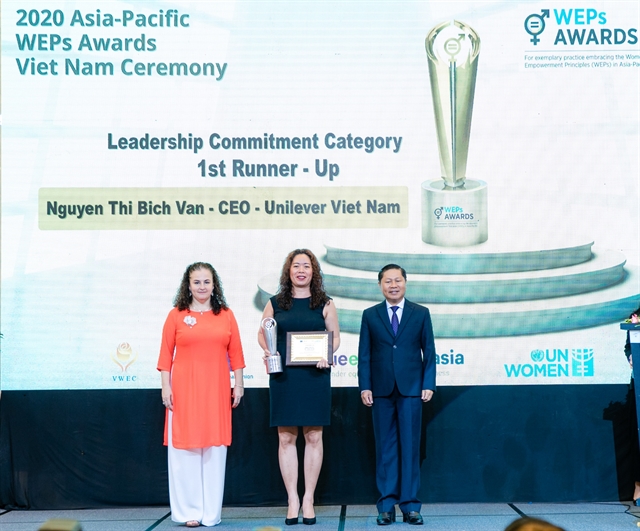Unilever Vietnam's President Nguyễn Thị Bích Vân discusses the importance of gender inclusion and women's empowerment in growing business as Việt Nam makes great strides in narrowing the gender gap.

This year, Unilever Vietnam has been honoured with WEPs (Women Empowerment Principles) Leadership Commitment and Gender-Inclusive Workplace awards by UN Women. The awards are to recognise the value and the efforts of individuals and businesses that promote gender-inclusive business cultures and the achievement of gender equality in Viet Nam.
Unilever Vietnam's President Nguyen Thi Bich Van discusses the importance of gender inclusion and women's empowerment in growing business as Viet Nam makes great strides in narrowing the gender gap.
What does women’s economic empowerment mean at Unilever Vietnam?
We want to be an inclusive business that contributes to creating a more inclusive world regardless of gender, age, race or ability - a world in which every woman and girl can build the kind of life she wishes to lead, unrestrained by harmful social norms and stereotypes. We want to actively drive gender equality through our value chain and with our brands to inspire others to take part in this journey to bring more opportunities to women, to help millions improve their well-being and livelihood.
Why did Unilever Vietnam apply for the WEPs Awards?
We aim to build an organisation with diversity and inclusion as its core values, in which women have equal opportunities to grow and to succeed. Working on this goal in the past has brought us lots of joy and rewards so we would like to share it. Through these awards, we hope to work together with WEP and pioneering businesses to implement and promote practices that empower women for a better Viet Nam.
Tell us about Unilever's gender equality initiatives and their impacts on business and society?
Gender inclusion has always been an instrumental part of our human resources development plan. We have implemented many initiatives both within our company and the community to promote gender equality and women's empowerment.
Internally, we have fostered an inclusive work environment for all and especially for our female employees. We have implemented a comprehensive plan that emphasises actions, having clear roadmaps, KPIs and tracking progress made on gender equality across levels in the organisation. We are proud to be breaking the glass ceiling here at Unilever Vietnam by promoting women to top leadership positions and encouraging more to reach their fullest potential.
We have been actively promoting agile working policies for all employees to provide flexibility and protect people’s health and well-being in critical situations. We are also driving enhanced paternity leave, subsequently providing young mums with better care. As a result, today we have a strong management team in which females account for nearly 53 per cent.
Externally, as a responsible business, we have been working closely with our long term strategic partner – the Vietnam Women's Union – since 2007 to empower disadvantaged women in 63 provinces with exciting programmes and commitment on investment of over VND240 billion (US$10 million).
Some highlights of our programmes include a micro-financing programme to support up to 50,000 women and their families to set up businesses with an evolving capital of around VND350 billion, health and hygiene education, which has been running for the past ten years, will continue to raise awareness, provide education on personal health, hygiene and nutrition for women and their families. Starting this year we’ve launched a “women do business” programme, which supports women with education and training with an aim to support five million women by 2025.
How can the private sector lead the charge on SDG5 – a UN sustainable development goal that focuses on gender equality - and help create a new ‘Generation Equality’ in business?
The private sector has an important role to play in realising SDG5 and in the creation of a new “Generation Equality” in business. First of all, we can raise awareness and communicate with our consumers on gender equality issues via creative and innovative campaigns.
Our popular and well-known brands in every household are an advantage. We also have an obligation to follow through with our commitments on SDG5. The better we deliver, the more consumers will appreciate our brands. We can share best practices and inspire business partners in our value chain including SMEs, customers and retailers to embrace the message of gender inclusion and women's empowerment.
Moreover, we will be the role model on the importance of gender equality in the long-term sustainable development of a business and inspire more companies to join us. We will join forces with governmental and non-profit partners to set out key priorities and to implement community programmes that will benefit millions of people in society.




